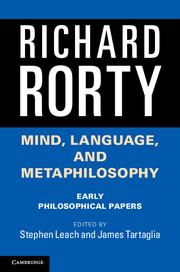Book contents
- Frontmatter
- Contents
- Foreword
- Acknowledgments
- Introduction
- 1 Pragmatism, categories, and language
- 2 The limits of reductionism
- 3 Realism, categories, and the “linguistic turn”
- 4 The subjectivist principle and the linguistic turn
- 5 Empiricism, extensionalism, and reductionism
- 6 Mind-body identity, privacy, and categories
- 7 Do analysts and metaphysicians disagree?
- 8 Incorrigibility as the mark of the mental
- 9 Wittgenstein, privileged access, and incommunicability
- 10 In defense of eliminative materialism
- 11 Cartesian epistemology and changes in ontology
- 12 Strawson’s objectivity argument
- 13 Verificationism and transcendental arguments
- 14 Indeterminacy of translation and of truth
- 15 Dennett on awareness
- 16 Functionalism, machines, and incorrigibility
- Index of names
- References
9 - Wittgenstein, privileged access, and incommunicability
Published online by Cambridge University Press: 05 June 2014
- Frontmatter
- Contents
- Foreword
- Acknowledgments
- Introduction
- 1 Pragmatism, categories, and language
- 2 The limits of reductionism
- 3 Realism, categories, and the “linguistic turn”
- 4 The subjectivist principle and the linguistic turn
- 5 Empiricism, extensionalism, and reductionism
- 6 Mind-body identity, privacy, and categories
- 7 Do analysts and metaphysicians disagree?
- 8 Incorrigibility as the mark of the mental
- 9 Wittgenstein, privileged access, and incommunicability
- 10 In defense of eliminative materialism
- 11 Cartesian epistemology and changes in ontology
- 12 Strawson’s objectivity argument
- 13 Verificationism and transcendental arguments
- 14 Indeterminacy of translation and of truth
- 15 Dennett on awareness
- 16 Functionalism, machines, and incorrigibility
- Index of names
- References
Summary
Introduction
In this chapter, I wish to argue for the following theses:
(A) None of the arguments about the possibility of a private language or about the privacy of sensations and thoughts which Wittgenstein advances in the Philosophical Investigations provide good reason for doubting
(a) that words like “toothache” and “pain” are the names (in a nontrivial sense) of sensations which people sometimes experience, or
(b) that when I assert truly “I have a toothache” or “I am in pain,” I am describing the state of my consciousness, or
(c) that when I assert of another person “He has a toothache” or “He is in pain” I claim that he is experiencing the same sort of sensation that I do when I have a toothache or am in pain.
(B) None of these arguments give good reasons for rejecting as senseless the claim that “sensations are private.”
(C) None of these arguments give good reasons for rejecting as senseless the claim that “I know that I am in pain because I feel it.”
I have drafted these theses with an eye to recent discussions of Wittgenstein’s views about the privacy of sensations, and in the belief that certain confusions committed by Wittgenstein or his interpreters – notably between “privacy” in the sense of “susceptibility to privileged access” and in the sense of “incommunicability” – have led sympathetic commentators to attribute unnecessarily paradoxical views to him, and hostile critics to attack him by attacking these paradoxes.
- Type
- Chapter
- Information
- Mind, Language, and MetaphilosophyEarly Philosophical Papers, pp. 172 - 198Publisher: Cambridge University PressPrint publication year: 2014
References
- 2
- Cited by



